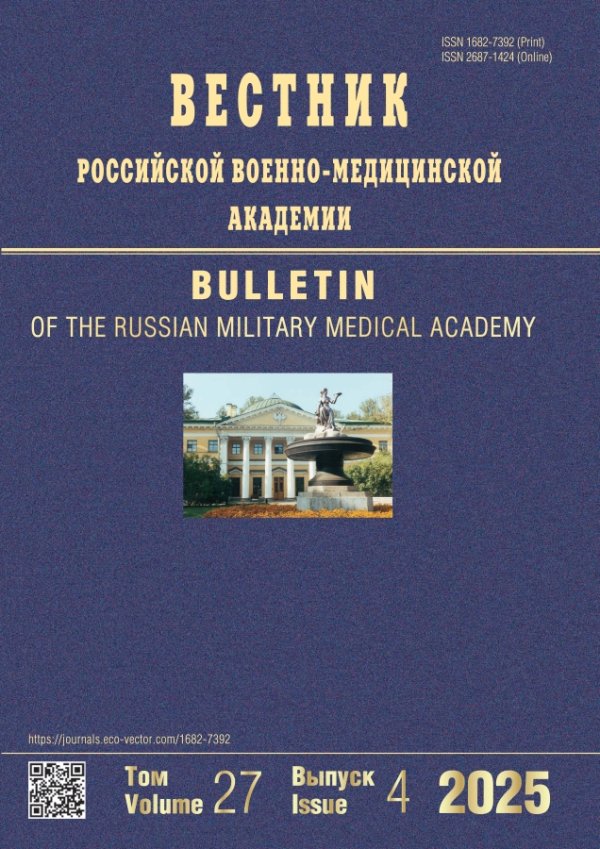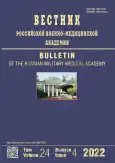Effect of the COVID-19 on the reproductive health indicators of cadets
- Authors: Ivchenko E.V.1, Schmidt A.A.1, Ovchinnikov D.V.2, Zakharov I.S.2, Popov A.S.1, Timoshkova Y.L.1, Gadzhiev S.Z.1
-
Affiliations:
- Military Medical Academy of S.M. Kirov
- Military medical academy of S.M. Kirov
- Issue: Vol 24, No 4 (2022)
- Pages: 667-674
- Section: Original Study Article
- URL: https://journals.rcsi.science/1682-7392/article/view/134066
- DOI: https://doi.org/10.17816/brmma111164
- ID: 134066
Cite item
Abstract
The study investigated the influence of coronavirus disease 2019 (COVID-19) caused by severe acute respiratory syndrome coronavirus 2 on the reproductive health indicators of cadets of military educational organizations. In the Department of Assisted Reproductive Technologies at the Clinic of Obstetrics and Gynecology of the Kirov Military Medical Academy, 183 male cadets aged 21–27 years were divided into two groups and examined. The first group consisted of 132 cadets who had mild and moderate COVID-19, and the second group included 51 cadets without COVID-19 in the anamnesis. COVID-19 was found negatively affect the reproductive health of cadets. Individuals who previously had COVID-19 were found to have a significant decrease in the level of total testosterone and decreased concentration and mobility of sperm in the ejaculate. Moreover, in cadets without COVID-19 who were vaccinated with the combined vector vaccine “Gam-COVID-Vac,” the indicators of the hormonal profile and spermograms were within the reference values. The results indicate the need for further investigation of the effect of various negative factors, including severe acute respiratory syndrome coronavirus 2, on the reproductive health of cadets of military educational organizations. Moreover, the development of preventive, therapeutic, and rehabilitation measures will reduce the risk of infertility and reproductive losses, which is consistent with the interests of national projects on healthcare and demography.
Full Text
##article.viewOnOriginalSite##About the authors
Evgeniy V. Ivchenko
Military Medical Academy of S.M. Kirov
Email: isza@mail.ru
ORCID iD: 0000-0001-5582-1111
SPIN-code: 5228-1527
doctor of medical sciences, associate professor
Russian Federation, Saint PetersburgAndrey A. Schmidt
Military Medical Academy of S.M. Kirov
Email: isza@mail.ru
ORCID iD: 0000-0002-9848-4714
SPIN-code: 4272-5069
candidate of medical sciences, associate professor
Russian Federation, Saint PetersburgDmitriу V. Ovchinnikov
Military medical academy of S.M. Kirov
Email: isza@mail.ru
ORCID iD: 0000-0001-8408-5301
SPIN-code: 5437-3457
candidate of medical sciences, associate professor
Russian Federation, Saint PetersburgIgor S. Zakharov
Military medical academy of S.M. Kirov
Author for correspondence.
Email: isza@mail.ru
ORCID iD: 0000-0001-6167-2968
SPIN-code: 2870-2520
doctor of medical sciences, associate professor
Russian Federation, Saint PetersburgAlexey S. Popov
Military Medical Academy of S.M. Kirov
Email: dr.a.s.popov@yandex.ru
candidate of medical sciences
Russian Federation, Saint PetersburgYulia L. Timoshkova
Military Medical Academy of S.M. Kirov
Email: yt6959546@yandex.ru
ORCID iD: 0000-0002-6618-3482
SPIN-code: 8175-8907
candidate of medical sciences
Russian Federation, Saint PetersburgSaid Z. Gadzhiev
Military Medical Academy of S.M. Kirov
Email: isza@mail.ru
ORCID iD: 0000-0002-4224-2441
SPIN-code: 4852-7365
clinical resident
Russian Federation, Saint PetersburgReferences
- Ivchenko EV, Kotiv BN, Ovchinnikov DV, Bucenko SA. Results of the work of the military medical academy research institute of novel coronavirus infection problems through 2020–2021. Bulletin of the Russian Military Medical Academy. 2021;23(4):93–104. (In Russ.). doi: 10.17816/brmma83094
- Svistunov SA, Shipitsyn KS, Kolesnikov VV. International experience in organizing medical care for the population of Italy and Serbia by military medical specialists during the COVID-19 pandemic. Russian Military Medical Academy Reports. 2022;41(1):93–98. (In Russ.). doi: 10.17816/rmmar84023
- Azarov II, Ovchinnikov DV, Kuzin AA, et al. Assessment of post-vaccination collective immunity against new coronavirus nfection (COVID-19) among servicemen of the Armed Forces of the Russian Federation. Bulletin of the Russian Military Medical Academy. 2022;24(2):267–276. (In Russ.). doi: 10.17816/brmma106245
- Kyzlasov PS, Korshunov MN, Korshunova ES, et al. The effect of COVID-19 virus on male fertility and erectile function. Experimental and Clinical Urology. 2022;15(2):88–94. (In Russ.). doi: 10.29188/2222-8543-2022-15-2-88-94
- Adamyan LV, Kiseleva YuYu, Elagin VV, et al. COVID-19 and men’s reproductive health (literature review). Russian Journal of Human Reproduction. 2020;26(5):17–21. (In Russ.). DOI: 10.17116/ repro20202605117
- Bourgonje AR, Abdulle AE, Timens W, et al. Angiotensin-converting enzyme 2 (ACE2), SARS-CoV-2 and the pathophysiology of coronavirus disease 2019 (COVID-19). J Pathol. 2020;251(3):228–248. doi: 10.1002/path.5471
- Corona G, Baldi E, Isidori AM, et al. SARS-CoV-2 infection, male fertility and sperm cryopreservation: a position statement of the Italian Society of Andrology and Sexual Medicine (SIAMS) (Società Italiana di Andrologia e Medicina della Sessualità). Journal of Endocrinological Investigation. 2020;43(8):1153–1157. doi: 10.1007/s40618-020-01290-w 4
- Wang Z, Xu X. scRNA-seq profiling of human testes reveals the presence of the ACE2 receptor, a target for SARS-CoV-2 infection in spermatogonia, Leydig and Sertoli cells. Cells. 2020;9(4):920. doi: 10.3390/cells9040920
- Yang M, Chen S. Pathological findings in the testes of COVID-19 Patients: Clinical Implications. Eur Urol Focus. 2020;6(5):1124–1129. doi: 10.1016/j.euf.2020.05.009
- Xu J, Qi L, Chi X, et al. Orchitis: A complication of Severe Acute Respiratory Syndrome (SARS) 1. Biology of Reproduction. 2006;74(2):410–416. doi: 10.1095/biolreprod.105.044776
- Apolikhin OI, Krasnyak SS, Sevryukov FA, et al. Assessment of the hormonal profile and dynamics of the state of the reproductive system in in patients with COVID-19: results of a prospective study. Experimental and Clinical Urology. 2022;15(1):120–128. doi: 10.29188/2222-8543-2022-15-1-120-128
- Esaulenko DI, Rozhivanov RR, Shishkina VV. Quality of ejaculate of male patients with type 2 diabetes mellitus (DM), vaccinated with GamCovidVac (Sputnik V). Diabetes Mellitus. 2021;24(5):422–426. doi: 10.14341/DM12775
- World Medical Association. Declaration of Helsinki: Ethical Principles for Medical Research Involving Human Subjects. JAMA. 2013;310(20):2191–2194. doi: 10.1001/jama.2013.281053
- GOST R 52379-2005. Natsional’nyi standart Rossiiskoi Federatsii. "Nadlezhashchaya klinicheskaya praktika" (utv. Prikazom Rostekhregulirovaniya dated 27.09.2005 N 232). 2005. 39 p. (In Russ.).
- Rukovodstvo VOZ po issledovaniyu i obrabotke eyakulyata cheloveka. 5-e izdanie. Vsemirnaya organizatsiya zdravookhraneniya, 2012. Moscow: Kapital Print; 2012. 291 p. (In Russ.).
- Ibishev KhS, Prokop YaO. New coronavirus disease (COVID-19): Is there an impact on male reproductive health? Urology Herald. 2022;10(1):128–134. (In Russ.). doi: 10.21886/2308-6424-2022-10-1-128-134
- Gacci M, Coppi M, Baldi E, et al. Semen impairment and occurrence of SARS-CoV-2 virus in semen after recovery from COVID-19. Hum Reprod. 2021;36(6):1520–1529. doi: 10.1093/humrep/deab026
Supplementary files











